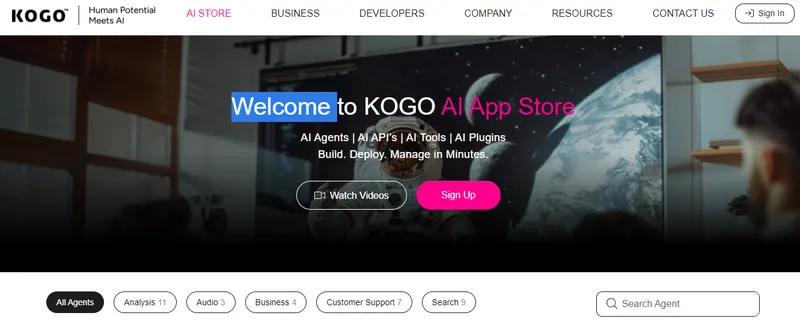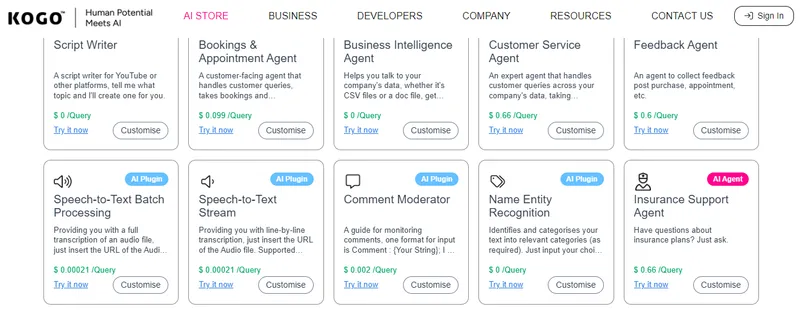Bengaluru-based AI company KOGO unveils its AI Agent Store
The platform currently has 58 agents, plugins, and tools in the store, and plans to expand it to a million AI agents by 2025.
KOGO, a Bengaluru-based AI startup that predominantly creates ready-to-deploy and custom AI Agents for enterprises and SMEs, has launched its AI Agent Store.
The AI Store caters to diverse sectors, offering a wide array of specialised agents and tools that meet specific business needs. Per the company, its AI agents cater to several industries, including travel, healthcare, finance, retail, and law.
“Agents are multiple-step automation execution programs powered by AI. For instance if someone wishes to book an appointment at a salon or a table at a restaurant, this requires bookings, multi-step execution and conversation, either through voice or through chat. Those are agents,” Praveer Kochhar, Co-Founder and CPO, KOGO, tells YourStory.
“AI agents are the layer on top of language models that can plan, reason, use tools, interact, and autonomously complete specific tasks and goals. So, from automation to autonomy, that is the difference,” explains Raj K Gopalakrishnan, Co-Founder and CEO, KOGO.
Plugins, on the other hand, are small programs that can help enhance a product experience. If someone runs a social media or an ecommerce platform and wishes to moderate the comments on the platform, they can instantly pick a plugin and you can add it as a comment moderator, he explains.
These are all pre-built, “Take the API, integrate it and you've got a comment moderator,” he adds.
The tools on its platform are AI-powered solutions that other companies have built, such as Sarvam’s text-to-speech model, and Azure’s speech-to-text model. Customers can integrate them on their platforms. The startup has partnered with various companies for them.
“All the tools that are available globally that can enhance the experience using AI, we want to bring under one umbrella on one platform. So, these are the three things that you can do from the store,” says Kochhar.
The store will operate on a pay-as-you-go model, where customers only pay for the usage of the agents and tools, and can recharge the wallet at any time.

Bringing the idea to life
KOGO was founded by Gopalakrishnan and Kochhar in 2020 and operates on a B2B model.
Beginning with the travel industry, the team then expanded its offering across multiple verticals, such as automotive, BFSI, retail, ecommerce.
Explaining AI Agents, Gopalakrishnan says, “Language models are like the engine of a car. The seat, the tire, the steering wheel, the clutch—all of these are tools that enable somebody to talk to legacy applications. But when you combine all those tools and the language model along with the body of a vehicle, with a driver and an AI map to go from point A to point B, that is essentially what an agent is.”
Simplifying the process
The company believes in taking the complexity of AI out and making building an agent simpler. Various factors need to be taken into account while building an AI agent—LLM ops, model build, model management, hallucination, human in the loop, and knowledge graphs are just the tip of the iceberg.
KOGO is solving this issue. Its USP lies in its ability to integrate AI safely and quickly, with predictability, says Kochhar.
With it being a no-code, low-code platform—one that doesn't require any coding is a platform as a service for enterprise clients. Additionally, with on-prem security, it makes data sharing safer.
Deploying AI agents also provides various insights such as sentiment analysis, satisfaction score, track usage, and error rates.

The startup provides ready-to-use templates that can be customised as per the users’ needs. And with the store, each client gets their personalised version of the store.
“There are two components to the product. One is what we call KOGO OS or the operating system. This operating system is really the base on which all the agents, tools and plugins run. So that's where you build everything. And once it is built, it sits inside the KOGO AI Agent Store,” explains Gopalakrishnan.
“For mid-market, you can use it off KOGO.ai or the entire OS and the store sits inside the environment of an enterprise. So every enterprise has its own version of the KOGO OS and its own version of the store and the store has pre-built agents that they can use for their use cases or we build additional agents which are custom agents specifically for that business using the OS, and that also sits inside their store,” he adds.
Growth and future
KOGO plans to have over one million AI agents in the store by 2025, it plans to do so via collaborations.
Developers can use KOGO’s AI Agent Builder to create agents for their clients which would be present in the client’s version of the store. Or they can upload them to the store for the general public to access. The readily-available code for various use cases helps developers and speeds up the process significantly.
“We want more and more developers to come and build on KOGO OS… We want this to become one of the largest stores of AI solutions, agents, and whatever comes next in AI,” says Kochhar.
The team believes that accelerated AI adoption is a potential lead towards work-life balance and aims for four-day-work weeks from March 2025.
With a confirmed pipeline of more than $4 million, the company is eyeing an ARR of about $8.5 million.
In addition to Indian clients, the company sees traction for its products from the UAE, Saudi Arabia, North America, and is currently rolling out in Mexico.
Edited by Affirunisa Kankudti








